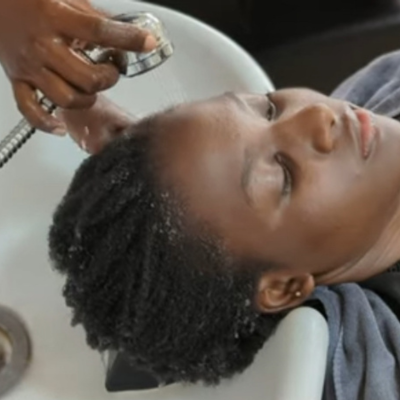- Support 24/7
- +1 (480) 468-4543
- livara@mylivara.com
The Link Between Vitamins, Minerals, and Hair Loss: Everything You Need To Know

The Truth About Sleeping with Deep Conditioner
July 10, 2024
How To Fix Dull Hair: 5 Easy Remedies
July 13, 2024
Hair loss is a common concern that affects millions of people worldwide. While genetics and aging are usually the primary culprits, the role of nutrition in maintaining healthy hair is gaining increased attention. Nutrients like vitamins and minerals are essential not only for overall health but also for the growth and maintenance of healthy hair. In this article, we delve into the intricate relationship between vitamins, minerals, and hair loss, drawing insights from the comprehensive analysis provided by Harvard Health.
Understanding Hair Growth
Hair growth occurs in cycles and is influenced by a variety of factors including genetics, hormonal changes, and overall health. Each hair follicle goes through a growth phase (anagen), a transition phase (catagen), and a resting phase (telogen). Disruptions in these phases can lead to hair thinning and loss.
Understanding Hair Loss: Common Causes and Contributors
Hair loss, also called alopecia, is a common condition that can cause emotional distress. While it can be a normal part of the aging process, hair loss can also result from a range of other causes and contributors, including:
• Inherited genetic disorders and inflammatory diseases
• Cancer and cancer treatments
• Hormonal fluctuations
• Stress
• Pregnancy
• Vitamin and mineral deficiencies
• Certain medications
• Substantial weight loss over a short period
• Recent surgery or illness
The most common type of hair loss in both males and females is androgenetic alopecia, or male/female pattern hair loss, which is inherited and leads to gradual thinning after puberty. In males, it typically results in a receding hairline and baldness on the crown, while in females, it causes thinning at the part line.
Other common types include telogen effluvium (TE), which involves sudden, drastic shedding after major stressors, and alopecia areata (AA), an autoimmune condition causing sudden round patches of hair loss. These types are nonscarring, meaning no permanent damage to the hair follicles or scalp occurs, allowing for potential regrowth. About 73% of all hair loss falls into this category.
How Vitamins and Minerals Affect Hair Health
Vitamins and minerals play crucial roles in maintaining the health of our hair. They contribute to various bodily functions that are directly and indirectly linked to hair growth and maintenance. According to the Harvard Health article, certain vitamins and minerals are essential for hair health, and deficiencies in these nutrients can lead to hair loss.
- Cellular Turnover and Growth:
Hair is composed of cells that rapidly grow and divide. Vitamins and minerals are critical for the cellular turnover and growth processes. For instance, Vitamin A is necessary for cell growth, including hair cells, while Vitamin D has a role in the creation of new hair follicles. - Blood Circulation:
Vitamins and minerals also aid in maintaining healthy blood circulation, which is essential for delivering oxygen and nutrients to hair follicles. B vitamins, particularly B12, help create red blood cells that carry oxygen to the scalp and hair follicles, ensuring they receive the nourishment needed for growth. - Protection Against Oxidative Stress:
Oxidative stress caused by free radicals can damage hair follicles, leading to hair thinning and loss. Antioxidants like Vitamins C and E protect hair follicles from oxidative stress, thereby promoting healthy hair growth. - Protein Synthesis:
Hair is primarily made up of a protein called keratin. Vitamins and minerals play a vital role in protein synthesis and maintaining the structural integrity of hair. For example, zinc is crucial for the synthesis of hair protein and maintaining the oil glands around the hair follicles. - Hormonal Balance:
Some vitamins and minerals help in maintaining hormonal balance, which is essential for preventing hair loss. For instance, iron helps in maintaining proper levels of thyroid hormones, and deficiencies in iron can lead to thyroid dysfunction, which can cause hair loss.
Deficiencies in these essential nutrients can disrupt these processes, leading to weakened hair structure, poor hair growth, and eventually hair loss. Ensuring a balanced intake of these vitamins and minerals is critical for maintaining healthy hair.
The Role of Vitamins and Minerals in Hair Health and Their Sources
Specific vitamins and minerals that can contribute to hair health and their sources include:
- Vitamin A: Supports cell growth, including hair cells, and helps produce sebum, which moisturizes the scalp. Sources include sweet potatoes, carrots, spinach, and fish.
- Vitamin B2 (Riboflavin): Helps maintain healthy hair by supporting overall cellular function. Sources include dairy products, eggs, green leafy vegetables, and nuts.
- Vitamin B3 (Niacin): Improves blood circulation to the scalp, promoting hair growth. Sources include poultry, fish, whole grains, and legumes.
- Vitamin B7 (Biotin): Crucial for the production of keratin, a key protein in hair structure. Sources include eggs, nuts, seeds, and whole grains.
- Vitamin B9 (Folate): Aids in red blood cell formation and promotes healthy cell division, which is important for hair growth. Sources include leafy greens, beans, and fortified cereals.
- Vitamin B12: Helps produce red blood cells that carry oxygen to hair follicles, supporting hair health. Sources include meat, fish, dairy products, and fortified plant-based milks.
- Vitamin C: An antioxidant that protects hair follicles from oxidative stress and aids in collagen production, important for hair structure. Sources include citrus fruits, strawberries, bell peppers, and broccoli.
- Vitamin D: Stimulates the creation of new hair follicles and may help regulate hair growth cycles. Sources include sunlight exposure, fatty fish, fortified foods, and egg yolks.
- Vitamin E: Acts as an antioxidant, improving blood circulation to the scalp and supporting healthy hair growth. Sources include nuts, seeds, spinach, and avocados.
- Iron: Essential for delivering oxygen to hair follicles; deficiency can lead to hair loss. Sources include red meat, beans, lentils, and spinach.
- Selenium: Protects hair follicles from oxidative damage and plays a role in hair growth. Sources include Brazil nuts, seafood, and whole grains.
- Zinc: Supports hair tissue growth and repair and helps maintain oil glands around hair follicles. Sources include meat, shellfish, legumes, and seeds.
Addressing Shortfalls Through Diet and Supplements: Does It Help Hair Growth?
Consuming adequate vitamins and minerals is important for preventing and managing hair loss. Most people can cover all their nutritional needs through a healthy, balanced diet. However, if blood tests show that you have certain vitamin or mineral deficiencies, your doctor may recommend supplements. For example:
- Vitamin D: Vitamin D is essential for creating the cells that develop into hair follicles. It also supports healthy bones and your immune system. If you have hair loss and low vitamin D levels, your doctor may recommend vitamin D supplements.
- Iron: Iron is responsible for carrying oxygen to your hair follicles so your hair can grow. Iron supplements may be recommended if you have hair loss as well as iron deficiency confirmed by laboratory tests. Too much iron can be toxic, so supplements should be taken exactly as prescribed by your doctor.
- Vitamin C: Vitamin C is necessary to absorb iron from your diet. If you have both hair loss and iron deficiency, vitamin C supplements can help.
There is conflicting scientific evidence supporting the benefit of vitamin A, vitamin E, zinc, selenium, vitamin B2 (riboflavin), vitamin B3 (niacin), vitamin B7 (biotin), and vitamin B12 for hair loss. Your doctor can make recommendations tailored to your needs based on laboratory test results.
It is also important to understand that supplementing with too much of certain vitamins or minerals can be harmful. Excessive intake of vitamin A and selenium, for example, can lead to increased hair loss. And consuming too much vitamin A or iron is toxic. Too much biotin (vitamin B7), a popular vitamin found in skin, hair, and nail supplements, can interfere with lab tests, including the assessment of thyroid function and certain hormone levels.
The Link Between Vitamin and Mineral Deficiencies and Hair Loss
You may experience hair loss if you are deficient in any of the vitamins and minerals that are essential for healthy hair. As discussed, your doctor can test for some vitamin and mineral deficiencies using blood tests and can make recommendations based on these findings. Addressing any deficiencies through diet and supplementation may prevent hair loss and support hair growth.
However, shortfalls in these micronutrients are rarely the only cause of hair loss. If your hair loss is caused by another underlying medical condition or a particular stressor, then diet and supplementation may not provide a noticeable benefit.
Practical Tips for Maintaining Healthy Hair Through Nutrition
1. Balanced Diet: Ensure a balanced diet rich in essential vitamins and minerals. Include a variety of fruits, vegetables, lean proteins, and whole grains in your meals.
2. Supplements: If you suspect a deficiency, consider supplements. However, it’s best to get nutrients from food sources and consult a healthcare provider before starting any new supplement regimen.
3. Hydration: Staying hydrated is crucial for overall health, including hair health. Drink plenty of water throughout the day.
4. Regular Check-ups: Regular medical check-ups can help identify any underlying health issues or deficiencies that might be contributing to hair loss.
5. Healthy Lifestyle: Manage stress through activities like exercise, meditation, and sufficient sleep. Use gentle hair treatments and excessive heat styling.
Conclusion
The health of your hair is closely linked to your overall nutritional status. Ensuring that you get enough vitamins and minerals through a balanced diet can play a significant role in preventing hair loss and promoting healthy hair growth. However, it’s important to remember that hair loss can be due to a combination of factors, and addressing it may require a multifaceted approach.
Have you experienced hair loss due to nutritional deficiencies? What changes did you make to improve your hair health? Share your stories and tips in the comments below!
For more detailed information on the connection between vitamins, minerals, and hair loss, you can refer to the Harvard Health article here: “Vitamins, minerals, and hair loss: Is there a connection?”
No information on this site, irrespective of its date, should be used as a replacement for direct medical advice from your doctor or another qualified healthcare provider.



